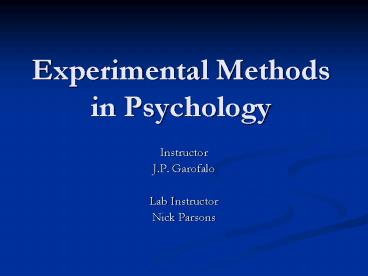Experimental Methods in Psychology - PowerPoint PPT Presentation
1 / 23
Title:
Experimental Methods in Psychology
Description:
Making sense of the world ... Making Sense of the World. What is the benefit of ... If a prediction is supported by data, one cannot say that the theory is true ... – PowerPoint PPT presentation
Number of Views:17
Avg rating:3.0/5.0
Title: Experimental Methods in Psychology
1
Experimental Methods in Psychology
- Instructor
- J.P. Garofalo
- Lab Instructor
- Nick Parsons
2
What is experimental psychology all about?
- Determine why organisms think and act as they do
- As a discipline, experimental psychology relies
on scientific procedures
3
What is experimental psychology all about?
- Before you start an investigation, you must
- Know something of the construct you plan to
investigate - Develop a plan to study the construct
- Experiment considered most powerful scientific
tool for any discipline
4
Making sense of the world
- Ringelmann (1927) with a sensitive gauge measured
how strongly subjects pulled rope - Groups of 2 performed at 95 of their capacity
- Groups of 3 performed at 85 of their capacity
- Groups of 8 performed at 49 of their capacity
5
Making sense of the world
- Bibb Latane
- People did not work as hard when working in a
group compared to working alone - Social Loafing
- Why do people engage in social loafing?
- Diffusion of responsibility
- People working by themselves believe they are
responsible for completing a task - However, when in a group, one believes that this
responsibility diffuses to others
6
Making Sense of the World
- Latane and Darley (1970) wanted to test the
theory of Helping Behavior - Hypothesis
- The more people who witness an emergency
situation, the less likely it is that any of them
will help the victim
7
Making Sense of the World
- What is the benefit of such research?
- Its findings may be applied later to solve some
practical problem - Williams, Harkins Latane (1981)
- when individual performance could be monitored in
group situation, people worked just as hard as
they did when they worked alone
8
Purpose of Scientific Psychology
- Curiosity
- Determining why organisms think and behave as
they do is the ultimate goal of a scientific
approach to psychology
9
Purpose of Scientific Psychology
- Knowledge
- Basic Research
- Glimpses of reality
- Applied Research
- Acquisition of practical knowledge
10
Purpose of Scientific Psychology
- Basic Research
- Often precedes applied work
- May be a lag time before basic research findings
translate into a practical product - Can be inspired by Applied Research
11
Sources of Knowledge
- Aside from Science, how do our beliefs and
knowledge of the world become fixed? - Authority
- Parents
- Professors
- Media
- Benefits
- Economic way learning about the world
- Feels safe to have complete faith in authority
figures - Disadvantages
- May be wrong
12
Sources of Knowledge
- Tenacity
- One refuses to alter acquired knowledge
regardless of evidence to contrary - Ex stereotypes
- Benefits
- Allows one to maintain consistent, familiar
outlook on life, and in turn, will reduce
psychological distress and uncertainty - Limitations
13
Sources of Knowledge
- A Priori
- Something believed without prior study/
examination - Similar to authority except that there is NO one
particular authority being followed - Cultural outlook fixes a belief a priori
- Experience fixes a belief a priori
- Advantages and Limitations
14
Sources of Knowledge
- Which method is best?
- If we define science as
- A repeatable, self-correcting undertaking that
seeks to understand phenomena on the basis of
empirical observation - Empirical refers to data (observations of the
world) obtained by systematic observation
15
Sources of Knowledge
- Authority, tenacity a priori methods do not
rely on data obtained by systematic observations - Did authority base his/her opinion on data?
- Tenacity refuses to consider data
- A priori methods rely on experience or casual
observation, but this is not systematic
16
Scientific Procedure
- Science begins with analysis
- Breaking down complex problem into its elements
- Psychological analysis of emotions, cognitions,
and behavior involve - Description
- Prediction
- Explanation
17
Scientific Procedure
- These 3 analytic activities correspond to 3 major
classes of research techniques used in scientific
psychology - Description Observation
- Prediction Correlation
- Explanation Experimentation
18
Nature of the Scientific Method
- Data
- Empirical Observations
- Theory
- Organization of concepts that permit prediction
of data - Induction
- Working from data to theory
- Deduction
- Working from theory to data
19
Nature of the Scientific Method
- Popper (1961) a philosopher of science
- Good theories must be fallible
- Empirical predictions must be capable of tests
that could show them to be false - Falsifiability view
- Negative evidence is more important than positive
support - If a prediction is supported by data, one cannot
say that the theory is true - A theory can never be proved, it can only be
disproved
20
Nature of Scientific Reality
- Scientific understanding is tentative
- Incorrect theories are modified
- Modification of theories requires empirical tools
- Baltimore (1997) Questions are not settled
rather, they are given provisional answers for
which it is contingent upon the imagination of
followers to find more illuminating solutions
21
Nature of Scientific Reality
- What is a theory?
- Set of related statements that explain a variety
of occurrences - The greater the number of occurrences and the
fewer the statements, the better the theory
22
Nature of Scientific Reality
- Evaluating Theories
- Three main criteria
- Parsimony
- Precision
- Testability
23
Nature of Scientific Reality
- Theory in psychology performs 2 major functions
- Provides framework for systematic and organized
display of data - Allows scientists to generate predictions for
situations in which no data have been obtained































